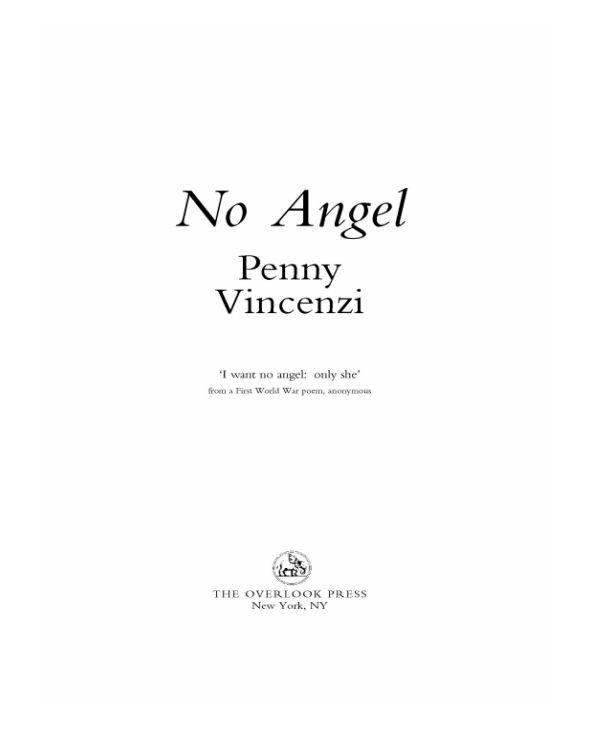
No Angel
کتاب های مرتبط
- اطلاعات
- نقد و بررسی
- دیدگاه کاربران
نقد و بررسی

September 15, 2003
Bestselling British author Vincenzi follows the tumultuous lives of London's Lytton family through the early 20th century in her first novel to be published in the U.S. At the story's center is Lady Celia Beckenham, a strong-willed, blue-blooded beauty who forces her parents to bless her marriage to the lower-ranking Oliver Lytton, employed in the "rough world of publishing," by getting pregnant. Taking her maternal duties in stride (her ugly baby, Giles, is initially "something of a disappointment"), Celia talks her way into an editorial position at Lyttons Publishing House, and quickly proves herself a fast learner with a head full of successful ideas. As years pass and more children arrive, Celia becomes known for her editorial skills and her familial devotion. But when Oliver returns after four years of fighting in WWI, her perfect world begins to crumble—he is dismayed by the books Lyttons has published under Celia's and his sister LM's guidance, and he has lost all desire for his wife. Celia seeks comfort in the arms of a handsome new author, and as she falls into an all-consuming affair, she begins to contemplate leaving Oliver: "She would have to go; go with Sebastian. Anything else was madness. She explored the decision for a few minutes, waiting for uncertainty to return. It didn't." But as Celia struggles to make her life-altering decision, events around her cause her to see herself and her family in a new light and to ponder what her life would be like if she weren't a Lytton. Through life and death, exuberance and sorrow, honor and disgrace, Vincenzi perfectly captures the intricacies of her characters and creates plots captivating enough to keep readers eyes' glued to this long and hearty saga. (Oct.)Forecast:Vincenzi has sold more than 3.5 million copies overseas, and Overlook is giving this title a big push with a 75,000 first printing and solid ad dollars; handselling to those looking to curl up with a happier doorstopper than last year's excellent but dark Crimson Petal and the White should also help.

August 1, 2003
In the tradition of Barbara Taylor Bradford, popular British novelist Vincenzi writes a family saga starring Celia Lytton, a smart, ambitious woman working against stereotype during World War I. In the opening scene, when the reader finds out Celia has purposely gotten pregnant so that her aristocratic parents will let her marry Oliver Lytton, the reader knows that this is a woman who gets her way. Vincenzi takes us through 20 years in Celia's life, using historical moments as background and introducing us to wonderful supporting characters, such as her strong-willed sister-in-law, LM, and her outspoken mother, the Countess of Beckenham. All of the novel's characters are three-dimensional, and the story enthralls us as it takes us through not only the emotional life of the Lyttons but also the wheeling and dealing of their publishing house. This entertaining novel is recommended for most fiction collections. [BOMC and Literary Guild selections; see "Must-Reads for Fall," p. 40.-Ed.]-Marianne Fitzgerald, Charlotte Mecklenburg Sch. Dist., NC
Copyright 2003 Library Journal, LLC Used with permission.

September 15, 2003
First published in England, where it sold three-million copies, this story of a proto-feminist at the turn of the century makes the transatlantic transition quite well. When the story begins, Lady Celia is an 18-year-old woman who knows what she wants, and what she wants is Oliver Lytton, heir to a publishing company. She gets pregnant to get him and quickly becomes a talented book editor at his firm; soon career and family life collide. Vincenzi does a number of things very well, including creating love affairs that seem breathlessly real. She also does well at juggling the many subplots that make up a family saga, and she knows how to paint a backdrop: Oliver's life-shaking stint in World War I, though not exactly "All Quiet on the Western Front," is deftly drawn. Somewhat less successful is her portrayal of several of the feminist characters, who, when displaying their liberationist tendencies, seem more twenty-first century than early twentieth. That aside, this sprawling melodrama is a natural for the Barbara Taylor Bradford crowd. (Reprinted with permission of Booklist, copyright 2003, American Library Association.)

























دیدگاه کاربران